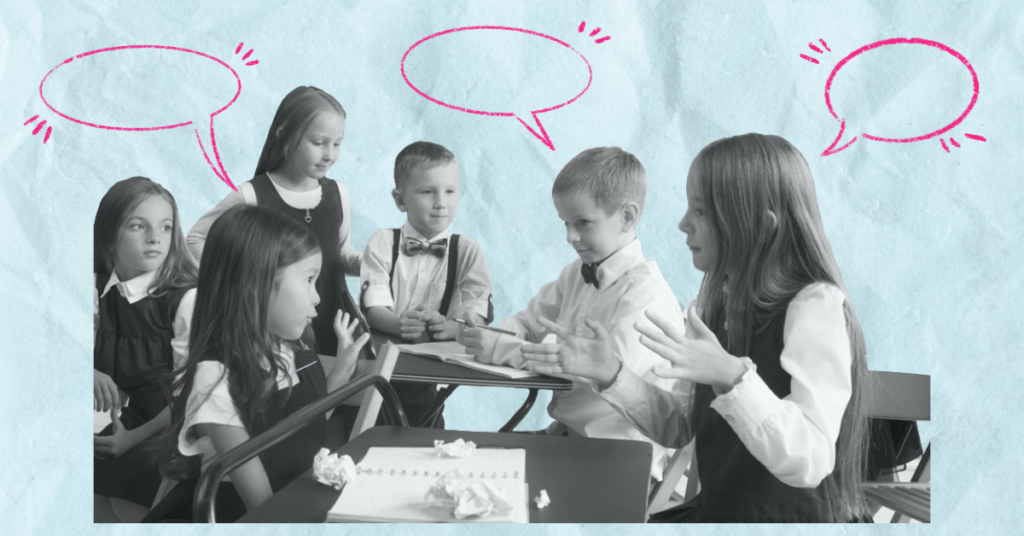What are verbal communication skills?
In any language, at any age, people learn to speak before they learn to read and write. Oral communication is the foundation for the development of literacy skills and is considered to be a strong indicator of later reading, writing and overall academic achievement.
Oral communication skills include two components. Expressive language (speaking) – the use of words and non-verbal processes to share meaning with others. Receptive language (listening) – the process of understanding what has been expressed.
What can poor oral communication skills look like?
Imagine you’re on holiday in Mexico. You stumble through words and phrases as you board transport, shop in foreign stores and purchase ‘two Coronitas, please’. You repeat the phrase ‘Dos cervezas, por favor’, before you start to get the hang of it. You play it out in your head as you approach the bar. You’re finally asked the million-dollar question – ‘¿Que quieres?’ – though despite the rehearsals, you go blank and respond in poorly constructed Spanglish. Oh well, maybe next time.
Receptive language
A child hears spoken language before they start ‘babbling’, imitating speech sounds and learning words and phrases. Think back to the bar from the Mexican holiday, (let’s assume it’s an extended holiday – one can dream) and imagine you’re sitting with locals hearing them talk. You feel lost as the words roll out of their mouths. Given enough time, you might start to recognise and understand some common words and phrases. Still, you haven’t started speaking yet. You are developing receptive language skills – listening and processing.
Expressive language
A week later, you’re sitting with the same locals and for what feels like the millionth time on this trip, you panic slightly at having to respond to the question – ‘¿Cómo estás?’. You’ve heard this phrase before. You process it, understand it and seem to answer internally in your first language. So, you attempt to answer in Spanish, finally responding sheepishly with ‘Moy bi-ahn, grah-see-ars.’.
Hooray! You’re using expressive verbal communication skills and are well on your way to hablando español!
What about reading and writing?
Are you exhausted yet? It’s normal to feel physically tired after trying to communicate in another language. Now imagine, after mastering how to say a few words or a simple phrase, someone asked you to write it down?
Are you serious?
Back to our holiday – the Mexicans strike up their usual conversations at 100 km/h so you tune out and turn to some signage nearby. You notice that the word ‘gracias’ looks totally different to the comprehensive phonetic spelling in your head ‘grah-see-ars’. You might be able to say the word but reading it challenges you further.
You can now see that it would take a considerable amount of speaking and listening before you felt at all confident in reading and writing.
Oral communication skills in modern classrooms
Consider how mentally draining this process would be for EAL/D learners who – for the record – aren’t on holiday. They’re pressured to read and write words and phrases daily before they have had the opportunity to properly master oral language.
Mastering oral communication skills is grounded in real world experiences and speaking and listening opportunities that reflect these experiences. Understanding oral development is essential to creating learning environments that optimise verbal communication skills.
These days, the need to focus on oral language activities is more important than ever. Educators all over Australia have noticed a decline in oral communication skills, attributing this to societal changes like the rise of screen time and the infrequency of face-to-face conversation.
Most classrooms now include a variety of EAL/D learners, especially in urban areas. However, whether or not there are EAL/D students in your class, oral language skills can always be practiced.
The great thing about oral language activities is that a lot of the time, they require little preparation and can be adapted to suit different ages, needs and topics. They can be cleverly weaved into daily programs to complement current class work and can be played as games. Activities of this nature are often a lot of fun for students. For these reasons, oral language activities can be a life saver for relief teachers.
Oral language activities for relief teachers
Readers theatre, recounts, retells, debates, hot-seating… these are only a few of the things you can do to support the development of verbal communication skills in your day-to-day work as a relief teacher.
You’ll find some effective and engaging oral language activities in this video:
Add them to your Relief Teacher Toolkit and try them out next time you’re in class!
For further reading you may find the blog 14 Ways to Improve Your Students’ Oral Language Skills – Brookes Blog (brookespublishing.com) helpful.



